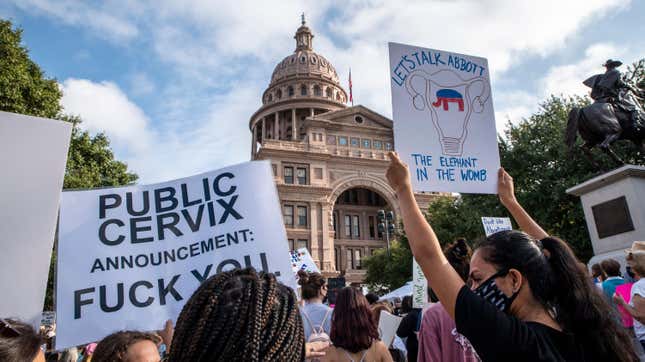Abortion Is (Literally) on the Ballot Tuesday in 5 States
California, Vermont, Michigan, Kentucky, and Montana are all putting ballot measures to a popular vote. Here's an explainer on each.
AbortionPolitics

As we head into Election Day on Tuesday, abortion is on the ballot—quite literally—in five states: California, Kentucky, Michigan, Montana, and Vermont. These ballot measures come just months after Kansas voters became the first in the nation to vote directly on the issue post-Roe v. Wade, overwhelmingly voting to keep abortion legal.
The result in Kansas was especially powerful given the difficult odds it beat: Anti-abortion activists wrote the measure with deliberately confusing wording and engaged in a disinformation campaign in the weeks leading up to the vote.
The states voting Tuesday are, of course, also seeing rampant disinformation campaigns. And as abortion bans spread, and the barriers to care—including the threat of criminalization—rise, the stakes have never been higher. So here are the facts on what each of these ballot measures does and does not do:
California
Pro-abortion rights position: Yes on Prop 1
In California, Prop 1 presents voters with the choice of enshrining the right to abortion in the state’s Constitution by voting “yes,” and rejecting this by voting “no.” California has become a post-Roe abortion rights haven, and establishing a constitutional right to abortion is essential no matter how “blue” the state appears to be. Believe it or not, there’s also a pretty substantial threat to abortion access across the West Coast right now, as Idaho’s abortion ban has prompted more patients to travel to Oregon for abortion, and polling shows the Democratic gubernatorial nominee in Oregon deadlocked with an anti-abortion Republican.
Anti-abortion organizers in the state have been challenging Prop 1 by pushing the false narrative that enshrining the right to abortion means “the right to abortion until birth,” which is… not a thing. “We already currently have abortion up to 24 weeks. Why do we need to push it beyond that?” Jonathan Keller, president and CEO of the anti-abortion California Family Council, told NPR of the group’s opposition to Prop 1. “Aren’t we able to say that that is a step too far, even for California?”
Abortion later in pregnancy, while rare, happens, often when emergencies arise or barriers prevent someone from getting an abortion earlier. Diagnoses of dangerous and extreme fetal conditions often aren’t possible until around 20 weeks in most cases. No pregnancy is exactly like another, and arbitrary cut-offs for abortion rights can create dangerous outcomes for pregnant people. Still, despite anti-abortion activists’ deceptive language, an August poll found 71% of California voters support Prop 1.
Vermont
Pro-abortion rights position: Yes on Prop 5
Like California’s Prop 1, Vermont’s Prop 5 would also amend the state Constitution to provide a constitutional right to abortion and reproductive autonomy. Prop 5 is widely popular, polling at 75% support as of last month. That hasn’t stopped anti-abortion organizers in the state from attacking the measure for creating the right to “abortion anytime for any reason”—which sounds great, actually. Thankfully, widespread support for Prop 5 makes it pretty clear Vermont voters are above the lie that abortion “up until birth” is a thing (it’s really not!).
Michigan
-

-

-

-

-

-

-

-

-

-

-

-

-

-

-

-

-

-

-

-

-

-

-

-

-

-

-

-

-

-

-

-

-

-

-

-

-

-

-

-








































